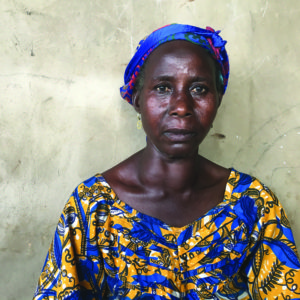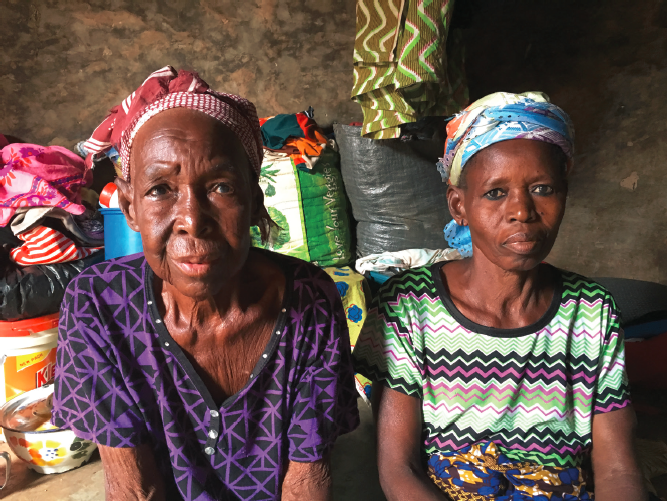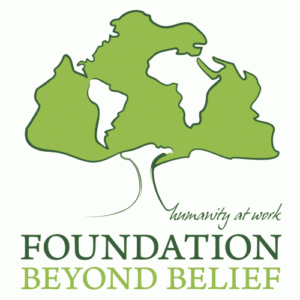Breaking Camp Humanist Service Corps Assists Ghanaians Accused of Witchcraft
 Mumuni Damata on the day she returned home from the witch camp at Kukuo. (Photo by Warren Alan Tidwell)
Mumuni Damata on the day she returned home from the witch camp at Kukuo. (Photo by Warren Alan Tidwell) In the early morning hours, Azara Majira is setting up her small store in her home village of Bandiyili in the Northern Region of Ghana. She sings softly to herself. Her store isn’t much more than a table and some small goods outside of her home but it provides enough for Azara to feed herself and her younger sister as well as buy necessities such as clothes and cooking materials.
At the same time in the town of Bimbilla, Mumuni Damata is busy preparing a dish known as Wasawasa from yam peels left over from the processing of the vegetable. Mumuni lives near a primary school and sells the dish to the children during lunchtime and after school. It allows her to be independent and take care of herself and her grandchildren.
Though they now live and work in Bandiyili and Bimbilla, respectively, Azara and Mumuni spent the previous thirty years in what is known as a witch camp. Decades ago both Azara and Mumuni were accused of witchcraft and banished. These camps exist because of the ongoing issue of witchcraft accusations in the Northern Region of Ghana. All it takes is one such accusation and a woman can be banished from her community, forced to flee to one of seven camps—that is if she isn’t injured or killed from the mob violence that often follows an accusation. The camps are believed to exist on land that takes the women’s power, thereby rendering them harmless. They exist as a sanctuary, yet conditions are often terrible for the residents. Survival is a struggle and most of the alleged witches in the camps are elderly.
In her days in the camps, Azara would often go hungry and depend on the kindness of the people of the village in Kukuo, as well as women who were also banished along with her. Mumuni also faced these struggles. The women in the camps live in homes constructed long ago from mud brick walls and thatched roofs. Many of the dwellings have collapsed over the years and the women who previously occupied them are buried just outside in unmarked graves. The vast majority of women never return to their home once they are banished to the witch camps.
After being accused of using witchcraft to kill her nephew, Azara was forced to leave and seek refuge in the camp in the village of Kukuo. Mumuni ended up there as well after an accusation in her own community. Kukuo is about thirty minutes away from Bimbilla (the largest town in the region), but life in this rural community is quite different than the more modern town. While some homes have electricity, most occupied by the alleged witches do not, and no one has running water. Even during the wet season Kukuo residents must walk a mile to fetch water from bore holes outside the village. Kukuo sits quite far from the nearest body of water, the Oti River, and in the dry season the holes themselves go dry as well. Residents are forced to make a long, arduous walk to the river to retrieve water. The weather is oppressively hot, there are hazards such as venomous snakes, and the loose rocks on the hills make it quite easy for someone to fall. It is not an easy existence for an able-bodied young person, let alone eighty- and ninety-year-old women.

Azara Majira (left) and her sister. (Photo by Warren Alan Tidwell)
Azara and Mumuni know the journey well. They no longer have to make it—the efforts of the Humanist Service Corps (HSC) and their local partner organization, Songtaba, have helped get them out of Kukuo and back to their home villages and towns, while also helping to set up sustainable livelihood options.
HSC, a division of Foundation Beyond Belief, has set up operations in the Northern Region of Ghana with a focus on helping women return home from the witch camps through reintegration efforts. These include mediation with family members and chiefs of their home communities. There are also efforts with sensitization, including science-based health education and access to general education for children and livelihood education for adults, all of which help to prevent witchcraft accusations, which in Ghana are based in the traditional African religion. Indeed, there is still widespread belief in the powers of evil as it pertains to witches. Humanist Service Corps has partnered with multiple organizations who work to support the women in the camps, and we have spent nearly two years working in the region.
So far the 2016-2017 HSC team has managed to help facilitate the return of fourteen women to their home villages. Sadly, two other women died just before making it home. The reintegration has been managed through a partnership with a local organization that mediates the women’s return. This is achieved by speaking with their families and, at times, those who made the allegations. Many times the accusers, while still believing in witchcraft, have simply gotten to the point that they no longer believe in the danger of witchcraft. A number of times the partner organization will offer financial support to repair housing so the women will have accommodations once they return. An effort is then made to arrange for livelihood options, which is often a critical element for the women to return home.
One of HSC’s core values is to work to make sure that our efforts and projects are sustainable. We never do things that the partner organization staff and local residents can do themselves, and we don’t promote ourselves in the witch camps and surrounding communities. Our work is focused on elevating the partner organization and training their staff on tasks and processes that they can then do themselves.
As it stands, there are still seven witch camps in the Northern Region of Ghana. As terrible as the conditions there may be, the members of HSC realize that these camps are the only sanctuary for the women at this time. If the camps didn’t exist, the women would have nowhere to go and they would be susceptible to mob violence. The longterm efforts of HSC will involve sensitization efforts to lessen the stigma of witchcraft allegations and lessen the incidence of accusations. This will involve educating the populace of the feeder communities (the women’s home communities) on the issues that often cause the allegations. Malaria, for example, often causes those afflicted to hallucinate and have strange dreams, symptoms that get mistaken for signs of witchcraft.
When the team recently went to do follow-up visits, they asked Azara how she was doing now that she was home from the camp. “I am so thankful to be home. What do you think of the success of my store?” she said. She wanted the team to see she was taking her opportunity seriously. Azara’s life is now a far cry from her struggles in the camp at Kukuo, and her last days will now be spent with her family in her home village.
Mumuni’s life has returned to normal, similar to the life she left behind long ago. While her children are grown, she now cares for her grandchildren. When she isn’t selling food, she’s washing clothes and cooking meals for them. In a follow-up interview, Mumuni was excited to tell of the changes in her life and how she no longer struggles for the most basic things. She is fulfilled in her duties and loves to spend her time playing with her grandchildren in the evenings.
In this corner of the world in the Northern Region of Ghana, the camps are relics of history that have mostly been left behind by the rest of the country. HSC is working toward a future when there is no longer a need for the witch camps by practicing compassionate and responsible service that supports and empowers locals. It is the hope of all who serve in HSC to one day see a Ghana free of the camps and free of witchcraft accusations altogether.
Editor’s Note: The authors were tremendously sad to learn after this article went to print that Mumuni Damata has died.
Humanism at Work
 Foundation Beyond Belief (FBB) (www.foundationbeyondbelief.org) is the only organization whose sole focus is on philanthropic efforts and that is specifically supported by nonbelievers. Founded in 2009 by Dale McGowan (who is now on the board of directors), FBB has given grants totaling over $2 million to a variety of charitable organizations and has logged over 125,000 volunteer hours from 100+ local groups who identify as nontheistic. The mission: unite the humanist community in volunteer and charitable efforts and advocate for compassionate action throughout the world. Using four impactful programs, FBB has designed avenues for secular humanists to engage in charitable activities, including international volunteering, providing grants to charities, responding to disasters, and supporting local secular groups.
Foundation Beyond Belief (FBB) (www.foundationbeyondbelief.org) is the only organization whose sole focus is on philanthropic efforts and that is specifically supported by nonbelievers. Founded in 2009 by Dale McGowan (who is now on the board of directors), FBB has given grants totaling over $2 million to a variety of charitable organizations and has logged over 125,000 volunteer hours from 100+ local groups who identify as nontheistic. The mission: unite the humanist community in volunteer and charitable efforts and advocate for compassionate action throughout the world. Using four impactful programs, FBB has designed avenues for secular humanists to engage in charitable activities, including international volunteering, providing grants to charities, responding to disasters, and supporting local secular groups.
The Humanist Service Corps (HSC) is one of those four programs, having evolved from the yearlong Pathfinders Project launched in 2013 by Conor Robinson. Volunteers of the United States, Ghana, and other nations work in the Northern Region of Ghana to assist women accused of witchcraft. Almost always, the women are forced to flee their homes to ensure their safety from severe violence or even death. The current team is the third FBB has sent to the region.
Through its Humanist Grants program, FBB provides quarterly grants to carefully vetted secular organizations working in the categories of Poverty & Health, Human Rights, Education, and the Natural World. Grants are entirely funded by monthly donors to the program who have the option to customize their gift to each category, thereby allowing humanists to have a real and direct impact on the causes that matter to them. This program has existed since FBB’s inception and is a truly unique way to allow donors to give within the framework of their humanist values as well as part of a community that identifies proudly as humanist.
When a disaster strikes, how can secular humanists help? FBB’s Humanist Disaster Recovery (HDR) program provides funds and/or volunteers to communities impacted by a disaster. Humanists who want to help donate through a drive for that specific community affected and then the total amount is granted to an organization (usually local) working on long-term recovery in that specific area. The HDR program also has a direct-service component whereby volunteers provide assistance to the affected community through projects such as rebuilding homes. FBB is proud to call the American Humanist Association a partner in their disaster recovery efforts.
The fourth program, Beyond Belief Network (BBN), brings together humanists, atheists, and other nonbelievers who are volunteering within their local communities. Local groups who identify as nonbelievers are eligible to join the network and, after reporting a certain number of events, receive benefits such as free t-shirts to provide a unified group look, small grants to assist in their volunteering efforts, and eligibility for annual awards. All BBN groups receive other benefits such as national and local media exposure, volunteering guides and resources, and more.
Foundation Beyond Belief transforms humanist values into compassionate actions through their direct service programs as well as their grants to secular charitable organizations worldwide. They provide humanists the opportunity to give together as a community of people who proudly identify as secular humanists. Working together, everyone has a greater impact than working separately. Foundation Beyond Belief is humanism at work.
